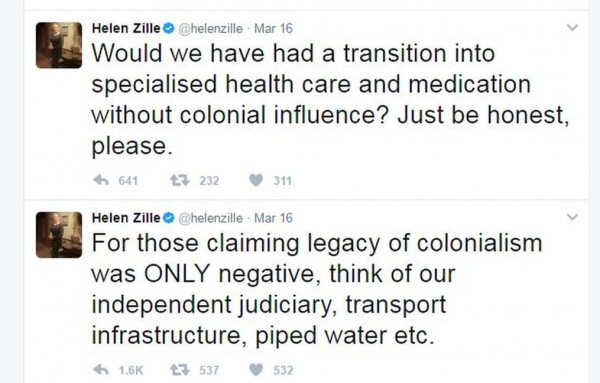Colonialism was Beneficial!
The anti-racist narrative states that past colonialism is to blame for all of today's African ills, for poverty, disease, wars, and corrupt governance.
Hearsay Disclaimer:
we are not History experts, we cannot affirm the truthfulness of the content of this chapter
There is a very parsimonious explanation. Individual average IQ in Africa is around 75, exacerbated by a group IQ effect, and improductive culture, impulsiveness, propensity to crime. &&&&&
Of course, this explanation is taboo, a thought crime, a violation of the PC bible's equality dogma. Nobel prize winner James Watson was ruined for suggesting the racist truth .....&& emperor's new clothes
There are strong indications that, on the contrary,
- (Sub-Saharan black) Africa, before colonialism, was at a totally undeveloped state without even 2 story buildings nor wheels (Hearsay Disclaimer)
- Natural resources like oil or Uranium are utterly useless for low tech populations. Thus exploration of such resources does not impoverish such countries. So exploration is not to blame for Africa's woes.
- Haiti has been independent, genocided all Whites 200 years ago. Freedom from white exploitation did not make it a rich powerful country. Rather, the African Blacks there made it into an African-style country.
- There is plenty of anecdotal evidence, and some scientific studies showing that the more colonialism, the better off the country.
- Rumors are that African colonialism was, to a large extent, for the humanitarian sake of preventing Africans from catching and selling slaves for the international slave trade.
- iq, group iq, agressiveness, .....
South Africa: I was Charged Because I am White‚ says Zille [Amren]
Zille is being disciplined over a March tweet in which she discussed the advantages of colonialism.
In a nine-page letter motivating why she should not be suspended‚ Zille said black people who shared the same views as her on colonialism were not treated in the same manner.
Zille made her motivation letter public moments after the DA confirmed her suspension.
“Given that so many black South Africans have expressed exactly the same views on the legacy of colonialism as I have (only in more forceful terms) and given that the DA has never raised any concerns about these views‚ let alone repudiated them‚ and has no written policy on the matter‚ I drew the conclusion that a contributing reason to my being charged is the fact that I am not black‚” said Zille.
“Other events of the past few months have led me and others to the conclusion that‚ in certain instances‚ DA members are treated differentially on the basis of race‚” she said.
Zille had caused outrage when she took to Twitter and wrote: “For those claiming legacy of colonialism was ONLY negative‚ think of our independent judiciary‚ transport infrastructure‚ piped water.” [Source South Africa: I was Charged Because I am White‚ says Zille [Amren]]
South African Apartheid: a case study on the effects of European colonialism in Africa
The impact of European colonialism on the world is often described as being profoundly negative. The popular view is that Europeans came, stole resources, destroyed cultures, and committed mass murder all over the earth. By contrast, the prevailing view 100 years ago was that Europe was supplying the world with advanced institutions which they would not develop on their own and, in so doing, was civilizing the world.
Either of these theories might be true, and, to some extent, they both are. It is obviously correct that Europe took resources from places, killed some number of people, and ended various indigenous cultural practices. It is also obviously true that Europe set up various institutions, such as capitalism and democracy, in various parts of the world which had not developed these things on their own.
A broad look at the empirical evidence suggests that European colonization helped most people more than it hurt them. Research has shown that the longer, or more heavily, a place was colonized by Europeans the richer it ended up being today (Eaverly and Levine, 2012; Feyrer and Sacerdote, 2006). Moreover, in the 20th century Africa, which is the center of much of the colonization debate, saw tremendous net gains in both wealth and population size (Manning, 2013; Roser; 2016)
I find this broad view compelling, but discussions on colonialism are rarely about the broad view. Instead, people like to talk about the anecdotal experiences of particular countries at particular times, and no anecdote is more often talked about than South African apartheid. [...]
Bantustans also suffered from tremendous poverty. As the Encyclopedia of Britiannia explains:
“The Bantustans were rural, impoverished, underindustrialized, and reliant on subsidies from the South African government.The original hope of the designers of the Bantustan system was that industries would be established along the Bantustan borders to utilize the cheap labour available nearby, but for the most part these hopes went unrealized. Other initiatives to create the illusion of viable economies for the Bantustans also broke down. To the end they were heavily dependent on financial aid supplied by the South African government. Poverty remained acute in the Bantustans, and child mortality rates were extremely high. Despite draconian control of where people were allowed to farm and the number of cattle they were permitted to have, Bantustan lands were oversettled, overgrazed, and hence afflicted with serious soil erosion.”
The Net Economic Impact of Bantustans
Such critics rarely mention the fact that as can be seen, in 1960, Black South Africans were exactly as poor as Sub-Saharan Africans generally were. By 1980 they were far richer (1).
Given this, it does not seem fair to say, as some people do, that Bantustans caused Blacks to be poor. Prior to being forced into these areas, Black South Africans were just as poor as Sub-Saharan Africans generally were. Had Black South Africans been left totally alone, there is no reason to think that they would have become any richer than the rest of Sub-Saharan Africa let alone richer than they were under Apartheid. The land in Bantustans may have been bad. But this, evidently, was more than made up for by payments from the South African government.
Milton Friedman on Slavery and Colonization
Transcript available via FreedomChannel: http://freedomchannel.blogspot.com/20...
Summary:
A student poses a question to Milton Friedman in which he asks for an appraisal of just how exactly the riches that now exist in the so called "capitalist democracies" were obtained and how those countries became so rich so quick. Specifically he asks Friedman to account for the effect that having free labor derived from slavery allowed them to enrich themselves, and how the possession of colonies allowed rich countries to bleed wealth out of their colonial domains.
Friedman responds by claiming it's simply untrue that the wealth that arose in Western countries was due to slavery. Slavery was a disgrace and a blot on the United States' record, but many rich Western nations did not have slavery. Britain and Japan did not have slaves when they developed and Hong Kong does not have slaves today.
He goes onto claim that the facts are against the notion that the wealth was created due to the West exploiting its colonies. The reason people are quick to think so is that they have an ingrained predisposition to see view the world as a zero-sum game where if one man gains the other man looses. In reality a free market allows everyone to gain through mutually beneficial voluntary transactions. When the West colonized Africa they brought with them technology that greatly improved the condition of the people that lived there and actually made them better off. The wheel for example had not even been invented in Africa in the 19th century. As a result of Africa's contacts with the West their condition improved greatly from what it previously was.
To the charge that colonizers bleed wealth from their colonies, Friedman notes that it has always cost the mother country more to maintain its colonies then what was ever received in direct or indirect economic benefit. In the famous case of India, conclusive studies have shown that it cost Britain far more to maintain India then if it had never had it. Furthermore, many Western nations never possessed colonies yet became wealthy despite that fact.
See also: Free to Choose - All 15 episodes streaming online for free http://www.ideachannel.tv
A history of Free to Choose http://www.freetochoose.com
Haiti: Then and Now
Thomas Jackson, American Renaissance, March 23, 2012 [...]
At the end of the book, Prichard asked the basic question: “Can the negro rule himself?”
He had a good chance at it. He had one of the most beautiful and fertile islands in the world. He inherited good French laws. He had cities built for him by the French. And yet, Haiti has produced only one figure that deserves real admiration: Toussaint Louverture [the leader of the struggle for independence from France].
Prichard believed that Louverture “was actuated throughout his life by no other feeling than that of love for his country,” and wondered whether the mere fact that he existed at all might be proof that blacks could rule themselves. On balance, however, he concluded that Louverture was too rare an exception: “Certainly he [the Haitian] has existed through one hundred years of internecine strife, but he has never for six consecutive months governed himself in any accepted sense of the word.”
Haiti today
More than 100 years later, Haitians are still “brutally misgoverned,” and some people are still asking, if not in so many words, “Can the negro rule himself?” In 2004, Gabriel Marcella of the US Army War College proposed setting up an international protectorate to save Haitians from themselves. Claude Beauboeuf, an economist, predicted that 65 to 70 percent of the population would support what would be, in effect, recolonization. (Carol J. Williams, “Protectorate Touted to Mend Haiti’s Crippled Society,” Los Angeles Times, Dec. 25, 2004.)
He was probably right. Jamaica is not nearly the horror Haiti is—it has been independent since only 1962—but a recent poll found that 60 percent of Jamaicans thought their country would be better if it were still ruled by the British. Only 17 percent disagreed. (“Poll: Most Jamaicans Believe UK Rule Better,” Yahoo! News, June 28, 2011.) [BBC, Telegraph]
A 2011 em>Wall Street Journal article pointed to Zimbabwe as the classic case of independence gone wrong, and suggested that essentially all of black Africa should be recolonized. The article quoted an 1881 letter from King Bell and King Acqua of the Cameroons River, West Africa, addressed to British Prime Minister William Gladstone: “We are tired of governing the country ourselves . . . . [W]e think it is the best thing to give up the country to you British men who no doubt will bring peace, civilization and Christianity in the country.” The kings even said they were “quite willing to abolish all our heathen customs.” (Bret Stephens, “Haiti, Sudan, Côte d’Ivoire: Who Cares?” Wall Street Journal,, January 11, 2011.)
Regnant egalitarianism forbids taking failed countries in hand, so they suffer as Haiti continues to suffer. [Source: Haiti: Then and Now]
A new poll suggests that most Jamaicans believe the island would be better off under British rule.
The poll of 1,008 Jamaicans for The Gleaner newspaper was conducted over four days by U.S. pollster Bill Johnson. Sixty per cent of those surveyed believed the island would be better off if it had remained a U.K. colony.
Seventeen per cent said the island would be worse off as a British colony and 23 per cent said they did not know. The poll had a margin of error of 4 percentage points.
Jamaica achieved independence from Britain in 1962.
Since then, the island has struggled with high crime, a hefty debt burden and inefficient government.
We were better off under apartheid‚ say EC villagers
"We shot ourselves in the foot by toppling the apartheid government‚" residents of an Eastern Cape village said on Thursday.
Tsholomnqa villagers had been waiting for a tarred road and decent houses for decades‚ said community leader‚ Wele Ntshongola.
He said the dawn of democracy had marked the beginning of the collapse of quality service delivery for the Eastern Cape rural area which is situated on the R72 outside East London.
"This village was in a good state under the Ciskei homeland led by LL Sebe. We used to have a tarred road... with workers who used to maintain it as well as free seed‚ crops and livestock." He said they celebrated when democracy dawned. "Little did we know that democracy would bring more oppression.
This democracy is not for everyone and poor rural dwellers are bearing the brunt." Ntshongola claims the villagers of are mostly ANC supporters and should be prioritised by the government.
"I am not saying that I agree with the policies or laws of apartheid‚ but at least we were getting service delivery back then."
Jamaicans would have been better off British - poll | BBC
A survey for a Jamaican newspaper suggests most islanders believe the country would have been better off if it had remained a British colony.
The poll, commissioned by The Gleaner, found that 60% of respondents backed this view. But 17% disagreed.
A thousand people took part in the survey, out of a population of 2.7m. The poll has a reported margin of error of plus or minus 4%.
Jamaica is due to celebrate 50 years of independence next year.
It is not clear what main reasons the respondents had for their choices.
But the island has struggled with high levels of poverty and crime.
The Gleaner has interpreted the results as suggesting "six in every 10 Jamaicans...long for 'the good old days'".
Wakanda vs Reality
[Source: Amren]: At the end of T’Challa’s speech at the United Nations, a white UN delegate asks what a nation of farmers has to teach the world. The point of the scene is clearly to rebuke whites who dismiss Africa as backward. Evidently, we are to base our real-world views of the continent on the basis of Wakandan fantasies. The actor who played King T’Chaka has made the extraordinary claim that the film “proves” Africa would be a technological wonderland were it not for colonization.
It would be easy to laugh, except that a professor at the Naval War College makes similar claims. In reality, Africa gained more from colonization than it lost. In any event, Africa will probably always be colonized; it is being re-colonized by China today. The mainstream media celebrating Black Panther as a crushing answer to past European colonization are largely indifferent to China’s penetration today. [Source: Amren]
Africa BC/AC (Before and After Colonialism) - American Renaissance
Mar 27, 2017 ... “Much of British colonial Africa was transformed during the colonial period,” writes Bauer, also in Equality, the Third World, and Economic .../pre>
Africa BC/AC (Before and After Colonialism) - The Unz Review
Mar 26, 2017 ... Before colonialism, sub-Saharan Africa was a subsistence economy; because of colonialism it became a monetized economy. Before ...
Colonialism Benefited the Colonized - American Renaissance
Jul 17, 2014 ... Years under US and Dutch colonial rule are significantly better than years under the .... it possible, indeed probable, that the people of such regions would be better off now, .... I'm talking about since Zimbabwe came to exist.
ParaPundit: Moeletsi Mbeki: Africa Was Better Off In Colonial Times
www.parapundit.com/archives/002366.htmlSep 23, 2004 ... Moeletsi Mbeki: Africa Was Better Off In Colonial Times ... Moeletsi Mbeki says the ruling party in Zimbabwe under Robert Mugabe has ...
&
Life in Rhodesia Was Better Than Zimbabwe - American Renaissance
https://www.amren.com/.../life-in-rhodesia-was-better-than-zimbabwe/
May 7, 2012 ... Most black Zimbabweans would now prefer Ian Smith as leader to .... En route, he reflects on the ambiguous legacy of European colonialism on the ..... country that is better off now under black rule than it was under white rule.
King Of The Zulus: Slams 'So-Called' South African Democracy ...
www.breitbart.com/.../king-zulus-slams-called-south-african-democracy-says- country-better-off-apartheid/
Dec 9, 2015 ... ... South African Democracy, Says Country Was Better Off Under Apartheid .... I believe that most of the black people of Zimbabwe (not the Zanu/PF ... under white colonial rule than it was under their own indigenous leaders.
Zulu King: Blacks Destroy S. Africa
The official king of South Africa’s Zulu tribe has announced that that country was economically, militarily, and socially better under white Afrikaner rule—and that history will judge blacks as only having destroyed everything that they had inherited from the white government. [...]
The event, held to mark his forty-fourth year on the Zulu throne, was reported on by the Natal Mercury newspaper.
Africa, Don't Blame the Whites - American Renaissance
Aug 27, 2008 ... (Does Robert Mugabe, Zimbabwe and the Zimbabweans come to mind?) ... Were Africans better off under colonial administration than the ...
Zimbabwean economist: We benefit greatly from the evil white man
Jan 24, 2013 ... Leading Zimbabwean economist says Africans have benefited immeasurably ... and not mere workers, the better off everyone will be in the long term. ... Despite their colonial baggage, the British were therefore “better” whites ...
Witchcraft Ban Ends In Zimbabwe - American Renaissance
Jul 5, 2006 ... In 1899, colonial settlers made it a crime to accuse someone of being ... Others believe that the country would be better off without elevating the ...
Zimbabwe: Blacks Admit Rhodesia Was Better – Occidental Dissent
www.occidentaldissent.com/.../zimbabwe-blacks-admit-rhodesia-was-better/
Apr 9, 2010 ... Zimbabwe: Blacks Admit Rhodesia Was Better .... Rhodesia was still going to support the White Souther African colonies within UK politics.
Zimbabwe’s Economy Is Crashing and Its People Are Hungry
The Economist 96 Comments “Zimbabwe is poor because its rulers are predatory.”
AFTER DECADES of mismanagement and corruption, Zimbabwe is a wreck. Its people are poor and hungry (see article). By early next year about half of them will need help to get enough food, says the UN’s World Food Programme. In a country that was once among Africa’s most industrialised, electricity flickers for only a few hours a day, often at night. Factories and bakeries stand idle while the sun shines. Workers arrive after dark, hoping that if they are patient they will be able to switch on their machines or ovens. In homes people wake up in the middle of the night to cook or iron their shirts. Freshwater taps work for a few hours once a week. Tendai Biti, an opposition MP and former finance minister, complains that life has gone back to colonial times: “I’m washing in a bucket, my friend, as if it is Southern Rhodesia in 1923.”
The crisis is Zimbabwe’s worst since the bad days of 2008-09, when President Robert Mugabe’s money-printing sparked hyperinflation so intense that prices doubled several times a week. That crisis was tamed only when Zimbabwe ditched its own currency and started using American dollars. This time, the government blames drought for the nation’s woes. [...]
Zimbabwe is poor because its rulers are predatory. But some blame must be shared by neighbouring governments, donors and lenders who, time and again, have looked the other way as the ruling party has rigged elections, tortured dissidents and looted the nation’s wealth. In 1987, when Mr Mugabe tried to create a de facto one-party state, Western diplomats crooned that a firm hand was probably what the country needed. In 2000, when Mr Mugabe sent thugs to seize white-owned commercial farms, some African leaders cheered the righting of a colonial wrong, ignoring the fact that much of the land was redistributed to cabinet ministers who barely bothered to farm it.
Africa BC/AC (Before and After Colonialism)
Even so—and whether they stay or go—the blame for all the ills of this backward and benighted region falls on Westerners. One dreadfully off-course notion has it that the colonial powers plundered Africa and failed to plow back profits into the place. This manifest absurdity is belied by the major agricultural, mineral, commercial and industrial installations throughout the continent. The infrastructure in Africa was built by the colonial powers. Far from draining wealth from less developed countries,” as P. T. Bauer richly documented, in Equality, the Third World, and Economic Delusion, “British industry helped to create it there.”
Another widely canvassed, equally implausible, accusation is that the West, which was streaks ahead of sub-Saharan Africa and Southeast Asia well before colonization, got rich on the backs of poor nations. How then do we explain the fact that the Scandinavian countries, Switzerland and Australia, have achieved some of the world’s highest living standards? After all, none of these nations had any colonies (except Australia, which after World War I acquired sovereignty over the former German territory consisting of what is now Papua New Guinea). They were rich without any meaningful ties to the undeveloped world. The wealthiest and most advanced countries were themselves colonies once: North America and Australia. As Bauer conclusively proved, the West’s human resources, and not any exploitation of the backward world, account for its innovation and achievements.
Much less is it legitimate to claim that contact with entrepreneurial Europeans and Asians has enervated Africa. Regions that have had the greatest commercial contact with the West are far and away more developed than regions that had little such contact. Compare the people of West Africa, parts of East and Southern Africa, and the inhabitants of Africa’s ports, with desert and rainforest dwellers like the Bushmen and pigmies. Or, with never-colonized Liberia, Afghanistan, Tibet and Nepal.
We can’t lay the blame for Africa’s tragedy on the much-deplored exploitation of natural resources either. Most natural resources are useless lumps of nothing. Without the ingenuity of men—iron, aluminum, coal and oil would lie purposeless and pristine in the wildernesses, and the matter and energy abundant on earth would come to naught. Such a state of affairs describes pre-colonial Africa, to which the colonial powers introduced the wheel and wheeled transport.
“Much of British colonial Africa was transformed during the colonial period,” writes Bauer, also in Equality, the Third World, and Economic Delusion:
In the Gold Coast there were about 3,000 children at school in the early 1900s, whereas in the mid-1950s there were over half a million. In the early 1890s there were in the Gold Coast no railways or roads, but only a few jungle paths. Transport of goods was by human porterage or canoe.
Before colonialism, sub-Saharan Africa was a subsistence economy; because of colonialism it became a monetized economy. Before colonialism, there were only bush back roads through which men trekked with goods on their backs. During colonialism roads were built. In pre-colonial times the absence of public security made investment in Africa too risky. Post-colonialism, investment flowed. With the colonial administrations came scientific agriculture, introduced by the colonists and by “foreign private organizations and persons under the comparative security of colonial rule, and usually in the face of formidable obstacles.”
‘In British West Africa public security and health improved out of all recognition . . . peaceful travel became possible; slavery and slave trading and famine were practically eliminated, and the incidence of the worst diseases reduced.’ Mortality fell, population increased, communications and ‘peaceful contact within Africa and with the outside world’ increased in British colonies.
As uneven and problematic as progress often was, “everywhere in Black Africa modern economic life began with the colonial period.” “Economic modernity could not have been effected without a mediated imperial structure,” maintains economist Niall Ferguson. In Africa, colonial governments encountered “conditions unfavorable to material progress,” to wit, civil and tribal war and slavery. By establishing the rule of law, protecting private property and enforcing contractual relations, building infrastructure, and organizing “basic health services,” and introducing modern financial and legal institutions—the colonial powers enhanced, rather than hindered, progress. Although—or perhaps because—all these advancements interfered with traditional customs, they also advanced the continent materially.
Clearly, political independence doesn’t go hand-in-glove with material progress. But grievance-based explanations have a way of evolving. Before independence, Africa’s backwardness was attributed to colonialism. After independence, neocolonialism replaced colonialism as the excuse du jour for the failure of African leaders to ameliorate their people’s plight. Neocolonialism encompasses any unhappy condition that can no longer be attributed to colonialism. Pizza Hut opening an outlet in Lima can easily be framed as the modern equivalent of Pizarro descending on the Incas, to paraphrase journalist Henri Astier.
On rare occasions the interests of an African politician and his people will converge. On one such occasion, and in desperation, the former president of Sierra Leone, the late Ahmad Tejan Kabbah, where life expectancy is just forty-nine years, “asked a visiting British politician, in the presence of journalists, if it might be possible for his country to become part of the British Empire again.”
When all is said and done, the West is what it is due to human capital—people of superior ideas and abilities, capable of innovation, exploration, science, philosophy. Human action is the ultimate adjudicator of a human being’s worth; the aggregate action of many human beings acting in concert makes or breaks a society. Overall, American society is superior to assorted African and Arab societies because America is still inhabited by the kind of individuals who make possible a thriving civil society.
Adapted from Into the Cannibal’s Pot: Lessons for America From Post-Apartheid South Africa (2011) by Ilana Mercer.
Zimbabwe: “Things are Getting Worse,” Admits Far Left Media
Rapefugees: sexual assaults and rape by refugees
Bill Ayers - Wikipedia, the free encyclopediaen.m.wikipedia.org
: https://en.m.wikipedia.org/wiki/Bill_Ayers
http://gawker.com/obama-secretly-partied-with-bill-ayers-last-summer-1684584845
http://thehill.com/homenews/administration/232674-report-obama-and-bill-ayers-attended-2014-wedding
Race and Slavery in the Middle East - Wikipedia, the free encyclopediaen.m.wikipedia.org
https://en.m.wikipedia.org/wiki/Race_and_Slavery_in_the_Middle_East
: http://blogs.wsj.com/economics/2012/06/25/european-colonization-boosted-economic-development/
[22:00, 8/25/2016] : Colonialism thing was covered in my Econ classes actually
[22:00, 8/25/2016] : Maybe it's changed by now but was only 10-16 years ago.
[22:02, 8/25/2016] : They rebutted the Leninist theory of colonialism The Darwin Digest Episode 25: Disease and European History.radio.therightstuff.biz
[22:05, 8/25/2016] : https://radio.therightstuff.biz/2016/08/21/the-darwin-digest-episode-25-disease-and-european-history/
[22:06, 8/25/2016] : Even Marx a thought it was partly good http://plato.stanford.edu/entries/colonialism/
[22:09, 8/25/2016] : http://plato.stanford.edu/entries/colonialism/
[22:10, 8/25/2016] : Colonialism was very costly. The military and administrative costs wee enormous. And gave few benefits. The European metropolises traded relatively little with their colonies and got few raw resources from them. Colonialism only benefited certain business barons (like Rhodes). Did Colonialism benefit or harm Africa?Answer (1 of 9): Colononism had both harms and benefits. The best way to answer the question is to put it into context.
Harms
Those are the main states in Africa in the 16th-17th centuries:
This is Europe at the same period:
Same as in other continents, we were slowly but surely shaping our ..
: African acknowledge benefits here: https://www.quora.com/Did-Colonialism-benefit-or-harm-Africa Why Re-Colonization? Commonweal OrientationDriving in Varanasi, India (Part II of two) Europe and the U.S. are both being overrun with illegal immigrants from the South. We...thosewhocansee.blogspot.com
: http://thosewhocansee.blogspot.cz/2015/09/why-re-colonization-commonweal.html?m=1
: I think they are overstating the Iberian thing. That commonweal orientation seems strongest in Germanics. I also notice Americans patiently wait in line unlike Puerto Ricans, but Puerto Rico seems kind of in between when compared to the more extreme cases discussed there, like the Iranians.
\\
I have observed that Anglos in mostly white areas tend to assume everyone can be trusted, that everyone is like them.
[12:53, 9/22/2016] : The level of cheating in China/India is much higher than Latin America and Eastern Europe. Latin America has a similar level to Eastern Europe.
[02:07, 9/24/2016] : Germanic law abindingness can be a very bad thing when the state is taken over by an enemy
[02:08, 9/24/2016] : Germanic people will obey the laws designed by their enemies, like anti-racism
[03:09, 9/24/2016] : I notice that in Latin cultures (Puerto Rico, Louisiana, etc.) the government will pass laws but people just ignore them in many cases
[03:10, 9/24/2016] : For instance, in French Louisiana it wax illegal for slave owners to have sex with slaves. They did it anyway feasting a mixed race. As long as slave owner didn't oppose the local governor he could do what he wanted
[03:11, 9/24/2016] : In Puerto Rico the law said you had to be white to be a doctor engineer lawyer wtc
[03:12, 9/24/2016] : In practice mixed people or even blacks could just pay a bribe and be declared white
[03:13, 9/24/2016] : Germanic people follow the law a lot more. When the government is good this is a good thing. But this is a very bad thing when the government is run by evil people or the enemy. Germans maybe the worst at this believing the anti-German propaganda of their enemies just because the government say so.
- Supreme Court HearsThe Court heard oral arguments Wednesday in a Texas case involving a murder defendant sentenced to death after a trial witness said he was more likely to commit crimes because he was black
- Here goes another, note the studies he mentions: https://youtu.be/4xeebU8VhmY
Africa BC/AC (Before and After Colonialism)
Before colonialism, sub-Saharan Africa was a subsistence economy; because of colonialism it became a monetized economy. Before colonialism, there were only bush back roads through which men trekked with goods on their backs. During colonialism roads were built. In pre-colonial times the absence of public security made investment in Africa too risky. Post-colonialism, investment flowed. With the colonial administrations came scientific agriculture, introduced by the colonists and by “foreign private organizations and persons under the comparative security of colonial rule, and usually in the face of formidable obstacles.”
‘In British West Africa public security and health improved out of all recognition . . . peaceful travel became possible; slavery and slave trading and famine were practically eliminated, and the incidence of the worst diseases reduced.’ Mortality fell, population increased, communications and ‘peaceful contact within Africa and with the outside world’ increased in British colonies.
As uneven and problematic as progress often was, “everywhere in Black Africa modern economic life began with the colonial period.” “Economic modernity could not have been effected without a mediated imperial structure,” maintains economist Niall Ferguson. In Africa, colonial governments encountered “conditions unfavorable to material progress,” to wit, civil and tribal war and slavery. By establishing the rule of law, protecting private property and enforcing contractual relations, building infrastructure, and organizing “basic health services,” and introducing modern financial and legal institutions—the colonial powers enhanced, rather than hindered, progress. Although—or perhaps because—all these advancements interfered with traditional customs, they also advanced the continent materially.
Clearly, political independence doesn’t go hand-in-glove with material progress. But grievance-based explanations have a way of evolving. Before independence, Africa’s backwardness was attributed to colonialism. After independence, neocolonialism replaced colonialism as the excuse du jour for the failure of African leaders to ameliorate their people’s plight. Neocolonialism encompasses any unhappy condition that can no longer be attributed to colonialism. Pizza Hut opening an outlet in Lima can easily be framed as the modern equivalent of Pizarro descending on the Incas, to paraphrase journalist Henri Astier.
On rare occasions the interests of an African politician and his people will converge. On one such occasion, and in desperation, the former president of Sierra Leone, the late Ahmad Tejan Kabbah, where life expectancy is just forty-nine years, “asked a visiting British politician, in the presence of journalists, if it might be possible for his country to become part of the British Empire again.”
When all is said and done, the West is what it is due to human capital—people of superior ideas and abilities, capable of innovation, exploration, science, philosophy. Human action is the ultimate adjudicator of a human being’s worth; the aggregate action of many human beings acting in concert makes or breaks a society. Overall, American society is superior to assorted African and Arab societies because America is still inhabited by the kind of individuals who make possible a thriving civil society.
Adapted from Into the Cannibal’s Pot: Lessons for America From Post-Apartheid South Africa (2011) by Ilana Mercer.
Apartheid’s “Bantu Education” was Better than Now,…
Rabelani Dagada, author, Development Economist, Information Technologist and Knowledge Management Specialist based at the Business School of the University of the Witwatersrand, Johannesburg, shocked attendees at a recent debate on the anti-white racism code-named “affirmative action” by telling them that the education currently provided by the black government had deteriorated to the worst in Africa.
“It (Apartheid education) was far better in terms of quality than the education that our kids are receiving nowadays,” Dagada said. “After 20 years of democracy, the education levels have plunged. It’s worse than the so-called Bantu education.”
Dagada’s comments echo a 2010 report by Britain’s BBC reporter Hugh Sykes, who found a large number of blacks living in shanty-towns in South Africa who also complained that “Some things were better under apartheid.”
Dagada, who has achieved all sorts of awards and honors, has good reason to be pessimistic.
 "Racism" is Love
"Racism" is Love 





